St. Philaret Metropolitan of New York had to lead very wisely the clergy and faithful of His Church (ROCOR – Russian Orthodox Church Outside of Russia) who had already the problem of having been uprooted from their homeland to an understanding of Orthodoxy in the age of the heresy of Ecumenism. He also wanted to enlight all the Orthodox world about this heresy and so he begins already in 1969 to sent open letters concerning this heresy.
Also in his First Sorrowful Epistle, it is clear that St. Philaret sees the catacomb church of Russia to be THE Russian Church.
Below, please read the First Sorrowful Epistle of St. Philaret Metropolitan of New York.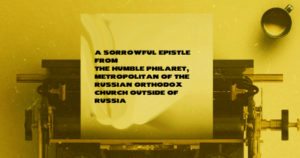
The First Sorrowful Epistle of Metropolitan Philaret
PRESIDENT
OF THE SYNOD OF BISHOPS
OF THE RUSSIAN ORTHODOX CHURCH
OUTSIDE OF RUSSIA
75 EAST 93rd STREET, NEW YORK, N.Y. 10028
Telephone: LEhigh 4-1601
TO THEIR HOLINESSES AND THEIR BEATITUDES
THE PRIMATES OF THE HOLY ORTHODOX CHURCHES
THE MOST REVEREND METROPOLITANS, ARCHBISHOPS, AND BISHOPS:
A SORROWFUL EPISTLE
FROM
THE HUMBLE PHILARET,
METROPOLITAN OF THE RUSSIAN ORTHODOX
CHURCH OUTSIDE OF RUSSIA
The Holy Fathers and Doctors of the Church have exhorted us to keep the Truth of Orthodoxy as the apple of our eye. And Our Lord Jesus Christ, teaching His Disciples to maintain every jot and title of the Divine Law intact said, “Whosoever, therefore, shall break one of these least commandments, and shall teach men so, he shall be called the least in the kingdom of heaven” (Matt. v. 19). He sent His disciples to teach the doctrines He gave them to all nations in a pure and unadulterated form, and that duty then devolved upon each of us Bishops, as the successors to the Apostles. We are also taught to do this by the dogmatic definition of the Seventh Ecumenical Council, which says: “We keep unchanged all the ecclesiastical traditions handed down to us, whether in writing or by word of mouth.” And the Holy Fathers of that Council added, in their first Canon: “The pattern for those who have received the sacerdotal dignity is found in the testimonies and instructions laid down in the canonical constitutions, which we, receiving with a glad mind, sing unto the Lord God in the words of the God-inspired David, saying: ‘I have had as great delight in the way of Thy testimonies as in all manner of riches.’ ‘Thou hast commanded righteousness as Thy testimonies forever.’ ‘Grant me understanding and I shall live.’ Now if the word of prophecy bids us keep the testimonies of God forever and to live by them, it is evident that they must abide unshaken and without change.”
Every one of us solemnly promises at his consecration to abide by our Faith and to obey the canons of the Holy Fathers, vowing before God to keep Orthodoxy inviolate from the temptations and errors which creep into the Church’s life.
If a temptation appears in the fold of only one Orthodox Church, the remedy for it may be found in the same fold. But if a particular evil penetrates into all our Churches, it becomes a matter of concern for every single Bishop. Can anyone of us be silent if he sees that many of his brethren simultaneously are walking along a path that leads them and their flock to a disastrous precipice through their unwitting loss of Orthodoxy?
Should we say in this case that humility commands us to keep silent? Should we regard it as indiscreet to lend advice to other descendants of the Holy Apostles, some of whom are occupying the most ancient and distinguished sees?
But Orthodoxy believes in the equality of all Bishops as regards grace and distinguishes between them only as regards honor.
Should we be satisfied with the fact that every Church is responsible for itself? But what if the statements which trouble the faithful are made in the name of the whole Church, and therefore also involve our name, even though we have not authorized anybody to use it?
St. Gregory the Theologian once said that there are occasions “when even by silence truth can be betrayed.” Should we not also be betraying the truth if, on noticing a deviation from pure Orthodoxy, we merely kept silence—always an easier and safer thing to do than speaking out?
We observe, however, that nobody in a higher position than our own is raising his voice; and this fact constrains us to speak out, lest at the Last Judgment we should be reproached for having seen the danger of Ecumenism threaten the Church, and yet not having warned her Bishops.
To be sure, we have already addressed His Holiness Patriarch Athenagoras and His Eminence Archbishop Iakovos of North and South America, expressing our grief and concern over their ecumenical activities, in which the birthright of the Church has been sold for a mess of pottage in the form of the world’s applause. But the position taken by the Orthodox delegates at the Assembly of the World Council of Churches at Uppsala makes the concern of the zealots of Orthodoxy even more acute and makes it necessary for us to communicate our sorrow and confusion to all our Brother Orthodox Bishops.
We may be asked why we write about that Assembly only now, nearly a year after the closing of its sessions. Our answer is that on this occasion we had no observers present, and obtained information about the Assembly only from the press, the accuracy of which is not always to be relied upon. Therefore we were awaiting the official reports; and having studied them, we find it imperative to address this letter to all the Orthodox Bishops whom the Lord has appointed to take care of His Church on earth.
The report on the Uppsala Assembly shocked us greatly because from it we could see more clearly than ever how far the error of Ecumenism is winning the official approval of a number of our Churches.
When the first steps were taken in the organization of the Ecumenical Movement, many of the Orthodox Churches, following the initiative of the Patriarch of Constantinople, began to participate in its conferences. At the time such participation did not cause any worry even among the most zealous Orthodox. They thought that the Church would suffer no injury if her representatives appeared among various truth-seeking Protestants with the aim of presenting Orthodoxy in the face of their various errors. Such a participation in inter-faith conferences could be thought of as having a missionary character.
This position was still maintained to a certain extent, though not always consistently, at the Evanston Assembly of the World Council of Churches in 1954. There the Orthodox delegates openly stated that the decisions of the Assembly diverged so sharply from our teaching on the Church that they were unable in any way to join with the others in accepting them. Instead, they expressed the doctrine of the Orthodox Church in separate statements.
Those statements were so plain that, in fact, they should have issued in the logical conclusion that the Orthodox ought not to remain as members of the World Council of Churches on the same basis as others. The Protestants might well have asked them: “If you disagree with our basic principles, why are you with us?” We know that in private conversations some Protestants did use to say this, but the question was not raised in the plenary sessions. Thus the Orthodox remained as members of an organization the disparate origin of which they had just so clearly illustrated.
But what do we see now?
The Pan-Orthodox Conference in Geneva in June 1968 took a different course. It expressed “the general desire of the Orthodox Church to be an organic member of the World Council of Churches and its decision to contribute in all ways to its progress, theological and otherwise, to the promotion and good development of the whole of the work of the World Council of Churches.” His Holiness Patriarch Athenagoras informed the World Council of this decision in his special letter dated June 30, 1968. There were no reservations; no mention was made of any missionary aims, either in the one case or the other.
We must be very clear as to what sort of religious union it is of which the Orthodox Church has been declared “an organic member,” and what the dogmatic implications of such a decision are.
In 1950, in Toronto, certain basic statements were accepted by the World Council of Churches which, while more cautious than the present statements, were already not in conformity with the Orthodox doctrine of the Church. On p. 4 it was then stated that “The member Churches of the World Council consider the relationship of other Churches to the Holy Catholic Church which the Creeds profess as a subject for mutual consideration.” This statement is already unacceptable for us because the Church is spoken of not as actually existing in the world, but as some kind of abstract entity mentioned in various Creeds. However, even then, on p. 3, we read: “The member Churches recognize that the membership of the Church of Christ is more inclusive than the membership of their own church body” (Six Ecumenical Surveys, New York, 1954, p. 13). But since in the preceding point (No. 2) it was stated that “The member Churches of the World Council believe on the basis of the New Testament that the Church of Christ is one,” there is either an implicit contradiction or else the profession of a new doctrine—viz., that no one can belong to the One Church without believing in her doctrines and without having liturgical unity with her.
The separate statements made in Evanston four years later on behalf of all the Orthodox delegates somewhat improved the situation because they clearly showed that Orthodox Ecclesiology differs so much in essence from Protestant Ecclesiology that it is impossible to compose a joint statement. Now, however, the Orthodox participants in the World Council of Churches act differently; in an effort to unite truth with error, they have abandoned the principle expressed at Evanston. If all the Orthodox Churches are organic members of the World Council of Churches, then all the decisions of that Council are made in their name as well as in the name of the Protestants.
If initially, the Orthodox participated in ecumenical meetings only to present the truth, performing, so to speak, a missionary service among confessions foreign to Orthodoxy, then now they have combined with them, and anyone can say that what was said at Uppsala was also said by the member Orthodox Churches in the person of their delegates. Alas that it should be said in the name of the whole Orthodox Church!
We regard it as our duty to protest in the strongest possible terms against this state of affairs. We know that in this protest we have with us all the Holy Fathers of the Church. Also with us are not only the hierarchy, clergy, and laymen of the Russian Orthodox Church Outside of Russia, but those members of other Orthodox Churches who agree with us as well.
We take the liberty of saying that it seems our Brother Bishops have treated this matter without sufficient attention, without realizing how far our Church is being drawn into the sphere of anti-canonical and even of anti-dogmatical agreements with the heterodox. This fact is especially clear if one turns to the initial statements of the representatives of the Orthodox Churches as compared with what is taking place at present.
At the Conference in Lausanne in 1937, the representative of the Ecumenical Patriarch, Metropolitan Germanos, clearly stated that restoring unity with the Church means for Protestants that they must return to the doctrines of the ancient Church of the Seven Ecumenical Councils. “And what are the elements of the Christian doctrines,” he said, “which should be regarded as necessary and essential? According to the understanding of the Orthodox Church, there is no need now to make definitions of those necessary elements of faith, because they are already made in the ancient Creeds and the decisions of the Seven Ecumenical Councils. Therefore this teaching of the ancient undivided Church should be the basis of the reunion of the Church.” That was the position taken by all the Orthodox delegates at the Lausanne and Oxford Conferences.
As for our Russian Orthodox Church Outside of Russia, her views were expressed with particular clarity upon the appointment of a representative to the Committee for Continuation of the Conference on Faith and Order on December 18/31, 1931. That decision was as follows:
“Maintaining the belief in the One, Holy, Catholic, and Apostolic Church, the Synod of Bishops professes that the Church has never been divided. The question is only who belongs to her and who does not. At the same time the Synod warmly greets the efforts of heterodox confessions to study Christ’s teaching on the Church with the hope that by such study, especially with the participation of the representatives of the Holy Orthodox Church, they may at last come to the conviction that the Orthodox Church, being the pillar and the ground of the truth (I Tim. iii. 15), fully and with no faults has maintained the doctrine given by Christ the Savior to His disciples. With that Faith and with such hope the Synod of Bishops accepts the invitation of the Committee for Continuation of the Conference on Faith and Order.”
Here everything is clear and nothing is left unsaid. This statement is essentially in agreement with what also used to be said at that time by official representatives of other Orthodox Churches.
What, then, has changed? Have the Protestants abandoned their errors? No. They have not changed, and the Church has not changed; only the persons who are now said to represent her have changed.
If the representatives of the Orthodox Churches had only continued firmly maintaining the basic principles of our belief in the Church, they would not have brought the Orthodox Church into the ambiguous position which was created for her by the decision of the Geneva Conference last year.
Since the Assembly of the World Council of Churches in New Delhi, the Orthodox delegates no longer make separate statements but have merged into one mass with the Protestant confessions. Thus all the decisions of the Uppsala Assembly are made in the name of “the Church,” which is always spoken of in the singular.
Who is speaking? Who gave these people the right to make ecclesiological statements not merely on their own behalf, but also on behalf of the Orthodox Church?
We ask you, Most Reverend Brothers, to check the list of the Churches participating in the Ecumenical Movement and in the World Council of Churches. Take, for instance, at least the first lines of the list on page 444 of The Uppsala 68 Report.
There you will find the following names: Evangelical Church of the River Plata, Methodist Church of Australia, Churches of Christ in Australia, The Church of England of Australia, Congregational Union of Australia, Presbyterian Church of Australia ….
Is it necessary to continue the list? Is it not clear that beginning with the very first lines, confessions are included which differ greatly from Orthodoxy, which deny sacraments, hierarchy, Church tradition, holy canons, which do not venerate the Mother of God and the Saints, etc.? We should have to enumerate nearly all of our dogmas in order to point out what in our Orthodox doctrines are not accepted by the majority of the members of the World Council of Churches—of which, however, the Orthodox Church is now nevertheless alleged to be an organic member.
Yet in the name of this union of the various representatives of all possible heresies, the Uppsala Assembly constantly states: “The Church professes,” “The Church teaches,” “The Church does this and that ….”
Out of this mixture of errors, which have gone so far astray from Tradition, the published decision on “The Holy Spirit and the Catholicity of the Church” makes the statement: “The Holy Spirit has not only preserved the Church in continuity with the past; He is also continuously present in the Church, affecting her inward renewal and re-creation.”
The question is: Where is the “continuity with the past” among the Presbyterians? Where is the presence of the Holy Spirit among those who do not recognize any mysteries? How can one speak of the catholicity of those who do not accept the decisions of the Ecumenical Councils?
If these doctrinal decisions were preceded by words indicating that one part of the Churches observes one doctrine, and the other a different doctrine and the teaching of the Orthodox Church were stated separately, that would be consistent with reality. But such is not the case, and in the name of various confessions, they say: “The Church teaches…. “
This in itself is a proclamation of the Protestant doctrine of the Church as comprising all those who call themselves Christians, even if they have no intercommunion. But without accepting that doctrine, it is impossible to be an organic member of the World Council of Churches, because that doctrine is the basis of the whole ideology on which this organization rests.
True, the resolution “On the Holy Spirit and the Catholicity of the Church” is followed by a note in fine print which says that since this resolution provoked such a great diversity of views, this decision is not final but only a summary of the matters considered in the Section. However, there are not such remarks regarding other similar resolutions. The minutes contain no evidence that the Orthodox delegates made any statements to the effect that the Assembly might not speak in the name of the Church in the singular; and the Assembly does so everywhere, in all its resolutions, which never have such qualifying remarks attached.
On the contrary, His Eminence Archbishop Iakovos, in his reply to the greeting of the Swedish Archbishop, said in the name of the Assembly, “As you well know, the Church universal is called by a demanding world to give ample evidence of its faith” (The Uppsala 69 Report, p. 103).
Of what “Church universal” did Archbishop Iakovos speak? Of the Orthodox Church? No. He spoke here of the “Church” uniting all confessions, of the Church of the World Council of Churches.
A tendency to speak in this fashion is especially conspicuous in the report of the Committee on Faith and Order. In the resolution upon its report, following statements about the success of Ecumenism, it says: “We are in agreement with the decision of the Faith and Order Commission at its Bristol meeting to pursue its study program of the unity of the Church in the wider context of the study of the unity of mankind and of creation. We welcome at the same time the statement of the Faith and Order Commission that its task remains ‘to proclaim the oneness of the Church of Jesus Christ’ and to keep before the Council and the churches ‘the obligation to manifest that unity for the sake of their Lord and for the better accomplishment of his mission in the world'” (ibid., p. 223).
The implication is clear in all these resolutions that, notwithstanding the outward separation of the Churches, their internal unity still exists. The aim of Ecumenism is in this world to make this inner unity also an outward one through various manifestations of such aspirations.
In order to evaluate all this from the point of view of the Orthodox Church, it is sufficient to imagine the reception it would find among the Holy Fathers of the Ecumenical Councils. Can anybody imagine the Orthodox Church of that period declaring itself an organic member of a society uniting Eunomians or Anomoeans, Arians, Semi-Arians, Sabellians, and Apollinarians?
Certainly not! On the contrary, Canon I of the Second Ecumenical Council does not call for union with such groups but anathematizes them. Subsequent Ecumenical Councils did the same in regard to other heresies.
The organic membership of Orthodox Christians in one body with modern heretics will not sanctify the latter but does alienate those Orthodox from the catholic-Orthodox unity. That unity is not limited to the modern age. Catholicity embraces all the generations of the Holy Fathers. St. Vincent of Lérins, in his immortal work, writes that “for Christians to declare something which they did not previously accept has never been permitted, is never permitted, and never will be permitted,—but to anathematize those who proclaim something outside of that which was accepted once and forever, has always been a duty, is always a duty, and always will be a duty.”
Perhaps somebody will say that times have changed, and heresies now are not so malicious and destructive as in the days of the Ecumenical Councils. But are those Protestants who renounce the veneration of the Theotokos and the Saints, who do not recognize the grace of the hierarchy,—or the Roman Catholics, who have invented new errors,—are they nearer to the Orthodox Church than the Arians or Semi-Arians?
Let us grant that modern preachers of heresy are not so belligerent towards the Orthodox Church as the ancient ones were. However, that is not because their doctrines are nearer to Orthodox teaching, but because Protestantism and Ecumenism have built up in them the conviction that there is no One and True Church on earth, but only communities of men who are in varying degrees of error. Such a doctrine kills any zeal in professing what they take to be the truth, and therefore modern heretics appear to be less obdurate than the ancient ones. But such indifference to truth is in many respects worse than the capacity to be zealous in defense of an error mistaken for truth. Pilate, who said “What is truth?” could not be converted; but Saul, the persecutor of Christianity, became the Apostle Paul. That is why we read in the Book of Revelation the menacing words to the Angel of the Church of Laodicea: “I know thy works, that thou art neither cold nor hot: I would thou wert cold or hot. So then because thou art lukewarm, and neither cold nor hot, I will spew thee out of my mouth” (iii. 15-16).
Ecumenism makes the World Council of Churches a society in which every member, with Laodicean indifference, recognizes himself and others as being in error, and is concerned only about finding phrases which will express that error in terms acceptable to all. Is there any room here as an “organic member” for the One, Holy, Catholic, and Apostolic Church, which has always professed itself to be holy and without blemish because its Head is Christ Himself (Eph. v. 27)?
The LVII (LXVI in the Athens Syntagma) Canon of Carthage says of the Church that she is “the one spoken of as a dove (Song of Songs, vi.9) and sole mother of Christians, in whom all the sanctifying gifts, savingly everlasting and vital are received—which, however, inflict upon those persisting in heresy the great punishment of damnation.”
We also feel it is our duty to declare that it is impossible to recognize the Russian Church as legally and duly represented at the Pan-Orthodox Conferences called by His Holiness Patriarch Athenagoras. Those Bishops who participate in these Conferences in the name of the Russian Church with Metropolitan Nikodim at their head, do not represent the authentic Russian Church. They represent only those Bishops who by the will of an atheistic Government bear the titles of certain Dioceses of the Church of Russia. We have already had occasion to write about this matter to His Holiness Patriarch Athenagoras. These persons participate in meetings abroad only in so far as such participation is profitable to their civil authorities, the cruelest in the history of the world. Nero’s ferocity and Julian the Apostate’s hatred of Christianity are pallid in comparison.
Is it not to the influence of that Government that we must largely ascribe the political resolutions of the Uppsala Assembly, which repeat many slogans widely observable in Communist propaganda in the West?
In the concluding speech of the Chairman, Dr. Payne, it was said that “the Church of Jesus Christ must show actively the compassion of Christ in a needy world.” But neither he nor anybody else said a word about the millions of Christians martyred in the U.S.S.R.; nobody spoke a word of compassion about their plight.
It is good to express compassion for the hungry in Biafra, for those who constantly suffer from fighting in the Middle East or in Vietnam; but does that cover all the human afflictions of the present time? Can it be that the members of the World Council of Churches know nothing about the persecutions of Religion in the U.S.S.R.? Do they not know what iniquity is reigning there? Do they not know that martyrs for the Faith there are counted in the millions, that the Holy Scriptures are not published there and that people are sentenced to banishment with hard labor for distributing them? Do they not know that children there are prevented from lessons in the basic principles of Religion, and even from attending religious services? Do they not know of the thousands who have been banished for their Faith, about the children wrested from their parents to prevent them from receiving religious upbringing?
All this is certainly well known to anybody who reads the newspapers, but it is never mentioned in any resolution of the World Council of Churches. The ecumenical priests and Levites are passing by in silence and without interest, without so much as a glance in the direction of the Christians persecuted in the U.S.S.R. They are silent because the official representatives of the Church of Russia, in spite of all evidence to the contrary, deny the existence of these persecutions in order to please their civil authorities.
These people are not free. Whether they wish to or not, they are forced to speak in obedience to orders from Communist Moscow. The burden of persecution makes them more deserving of compassion than of blame. But being moral prisoners of the godless, they cannot be true spokesmen for the Russian Orthodox Church, suffering, deprived of any rights, forced to be silent, driven into catacombs and prisons.
The late Patriarch Sergius and the present Patriarch Alexis were elected in violation of the rules which were instituted by the All-Russian Church Council of 1917 at the restoration of the Patriarchate. Both were chosen according to the instructions of Stalin, the fiercest persecutor of the Church in history.
Can you imagine a Bishop of Rome chosen according to the instructions of Nero? But Stalin was many times worse.
The hierarchs selected by Stalin had to promise their obedience to an atheistic Government whose aim, according to the Communist program, is the annihilation of Religion. The present Patriarch Alexis wrote to Stalin immediately after the death of his predecessor that he would observe fidelity to his Government: “Acting fully in concert with the Council for the Affairs of the Russian Orthodox Church and also with the Holy Synod instituted by the late Patriarch, I will be secure from mistakes and wrong actions.”
Everybody knows that “mistakes and wrong actions” in the language of the Moscow masters means any violation of the instructions given by the Communist authorities.
We can pity an unfortunate old man, but we cannot recognize him as the Head of the Russian Church, of which we regard ourselves an inseparable part. Both to Patriarch Alexis and his collaborators the sanctions of the XXX Apostolic Canon and Canon III of the Seventh Ecumenical Council can be doubly applied: “If any bishop, making use of the secular powers, shall by their means obtain jurisdiction over any church, he shall be deposed, and also excommunicated, together with all who remain in communion with him.”
Bishop Nikodim of Dalmatia, in his commentary on the XXX Apostolic Canon, says: “If the Church condemned the unlawful influence of civil authorities on the appointment of a bishop at a time when the Rulers were Christians, how much the more so, consequently, she had to condemn it when they were heathens.” What is there to say, therefore, when a Patriarch and Bishops are installed by the open and militant enemies of their religion?
When one part of the Russian Episcopate, together with the late Patriarch (at that time Metropolitan) Sergius, took the course of agreeing with the enemies of the Church in 1927, a large (and the most respected) part of that Episcopate, with Metropolitan Joseph of Leningrad and the first candidate of Patriarch Tikhon for the office of locum tenens, Metropolitan Cyrill of Kazan, did not agree to go along with him, preferring banishment and martyrdom. Metropolitan Joseph by that time had already come to the conclusion that, in the face of a Government which openly had as its goal the destruction of Religion by the use of any available means, the legal existence of a Church Administration becomes practically impossible without entailing compromises which are too great and too sinful. He, therefore, started secret ordinations of Bishops and priests, in that way organizing the Catacomb Church which still exists in hiding.
The atheists seldom mention the Catacomb Church, being afraid of giving her too much publicity. Only very rarely in the Soviet Press is the news of some trial of her members mentioned. Information about her, however, is given in manuals for anti-religious workers in the U.S.S.R. For instance, the basic information about this Church, under the name of “The Truly Orthodox Church,” is given in a manual with the title of Slovar Ateista (“The Atheist’s Dictionary”), published in Moscow in 1964.
With no open churches, in secret meetings similar to the catacomb meetings of the early Christians, these confessors of the Faith perform their services unseen by the outer world. They are the true representatives of the Russian Orthodox Church, whose greatness will become known to the world only after the downfall of the Communist power.
For these reasons, although representatives of the Moscow Patriarchate participated in the decisions of the Pan-Orthodox Conference in Geneva last year, and particularly in regard to making the Orthodox Church an organic member of the World Council of Churches,—we look upon that decision as having been accepted without the participation of the Russian Orthodox Church. That Church is forced to stay silent, and we, as her free representatives, are grieved by the fact that such a decision was accepted. We categorically protest that decision as being contrary to the very nature itself of the One, Holy, Catholic, and Apostolic Church.
The poison of heresy is not too dangerous when it is preached only from outside the Church. Many times more perilous is that poison which is gradually introduced into the organism in larger and larger doses by those who, in virtue of their position, should not be poisoners but spiritual physicians.
Can it be that the Orthodox Episcopate will remain indifferent to that danger? Will it not be too late to protect our spiritual flock when the wolves are devouring the sheep before their pastors’ eyes, inside the very sheepfold itself?
Do we not see the divine sword already raised (Matt. x. 34), separating those who are true to the traditional faith of the Holy Church from those who, in the words of His Holiness Patriarch Athenagoras in his greeting to the Uppsala Assembly, are working to shape the “new drive in the ecumenical movement” for the “fulfillment of the general Christian renewal” on the paths of reformation and indifference to the truth?
It seems that we have shown clearly enough that this apparent unity is not unity in the truth of Orthodoxy, but a unity that mixes white with black, good with evil, and truth with error.
We have already protested against the unorthodox ecumenical actions of His Holiness Patriarch Athenagoras and Archbishop Iakovos in letters which were widely distributed to Bishops of the Orthodox Church in various countries. We have received from different parts of the world expressions of agreement with us.
But now the time has come to make our protest heard more loudly still, and then even yet more loudly, so as to stop the action of this poison before it has become as potent as the ancient heresies of Arianism, Nestorianism, or Eutychianism, which in their time so shook the whole body of the Church as to make it seem that heresy was apt to overcome Orthodoxy.
We direct our appeal to all the Bishops of the Orthodox Church, imploring them to study the subject of this letter and to rise up in defense of the purity of the Orthodox Faith. We also ask them very much to pray for the Russian Orthodox Church, so greatly suffering from the atheists, that the Lord might shorten the days of her trial and send her freedom and peace.
Metropolitan PHILARET
In New York,
Sunday of the Sixth Ecumenical Council,
14/27 July 1969

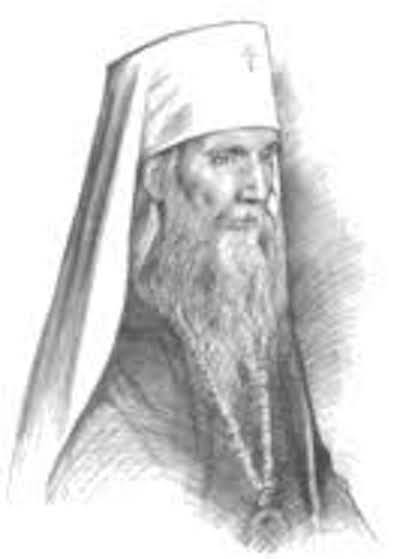
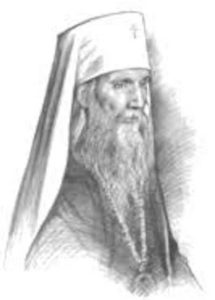




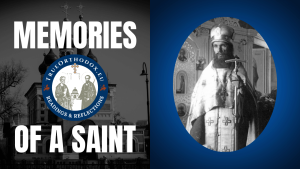

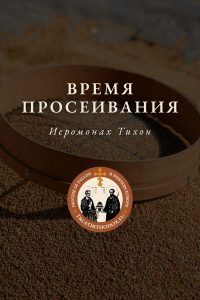




1 thought on “St. Philaret Prepares the Way with His First Sorrowful Epistle”